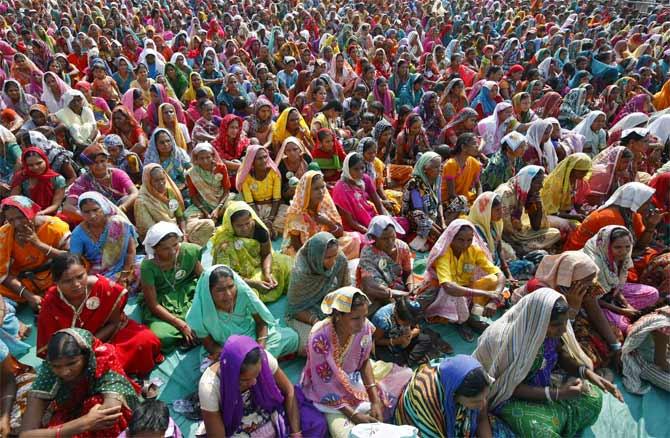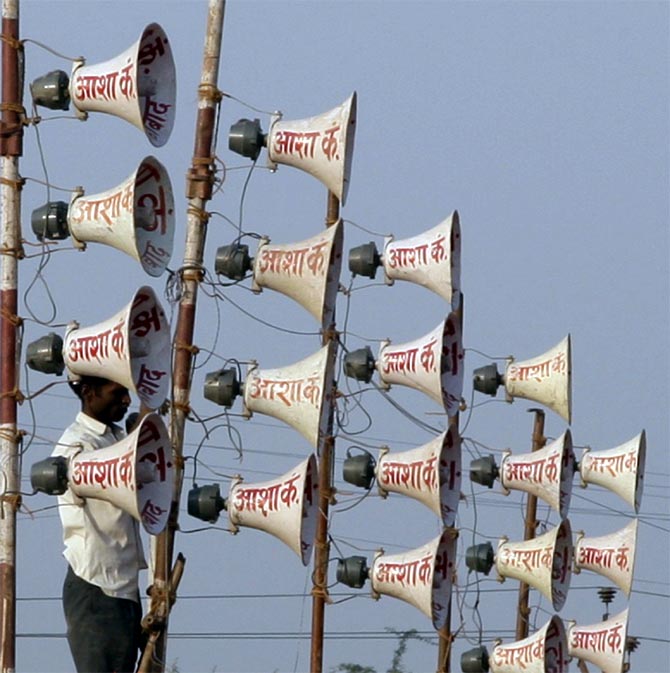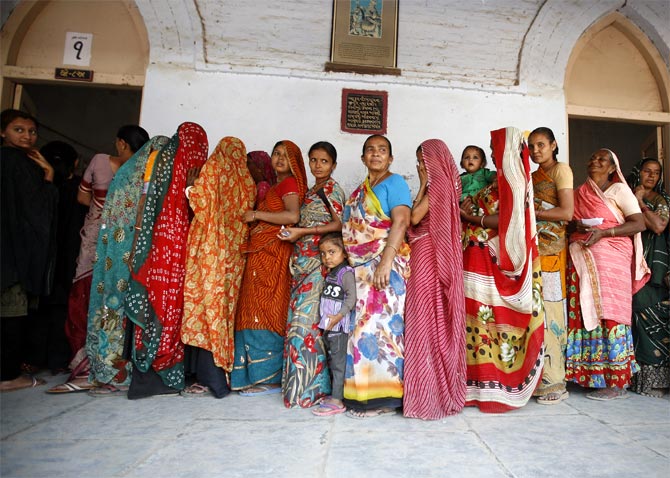 | « Back to article | Print this article |
'Banning opinion polls a mindless, evidence-less attempt to curb free speech'
"Let us assume that opinion polls do affect voting behaviour in some way or the other. What is wrong with that? Don't political speeches affect voting behaviour? Don't editorials affect voting behaviour? Don't political advertisements affect voting behaviour? Don't manifestos affect voting behaviour? So, why not opinion polls?"
"In the market for influence, let us follow Chairman Mao and 'Let a hundred flowers bloom'," says well-known Election Analyst Dorab R Sopariwala.
The Election Commission's suggestion to ban opinion polls has kicked up a storm. The Congress endorsed the Election Commission's view while the Bharatiya Janata Party attacked the Congress for running scared after poll surveys revealed that the party is in for a drubbing in the upcoming assembly elections.
The Congress has banned its spokespersons from appearing on opinion poll shows on news television channels, terming the exercise 'erroneous' and 'manipulated'.
The Election Commission is expected to submit its report to the government shortly, based on the feedback received on its suggestion from various political parties. However, the idea of such a ban has been widely criticised as an attempt to curb the freedom of speech.
"The Election Commission places no restriction on politicians knowingly spewing out incorrect information, on some journalists who speak to ten people -- if that -- and produce learned observations on the outcome of the elections, including seat predictions, on newspaper editorials, etc,' says the well-known Election Analyst Dorab R Sopariwala.
"Surely, they can also be said to 'negatively impact voting and become an obstacle to free and fair elections.' Shall we ban that too?" he asks.
In an e-mail interview with Rediff.com's Archana Masih, he says that opinion polls should be treated on par with all other forms of free speech that influence elections.
What are your views on the Election Commission's suggestion to do away with opinion polls because it believes it could negatively impact voting and become an obstacle to free and fair elections?
The publication of polls is already banned during 48 hours before the closing of voting. The Election Commission now wants to ban opinion polls in the run-up to the polls.
Your question says 'because it believes it could negatively impact voting.' You use the words 'it believes.' Should the right of publishing polls -- which is akin to free speech -- be withdrawn because someone 'believes' something?
Should there not be some scientific evidence other that the belief of unelected babus and judges that should decide whether the publication of opinion polls should not be permitted in the run-up to elections?
And the Election Commission places no restriction on politicians knowingly spewing out incorrect information, on some journalists who speak to ten people -- if that -- and produce learned observations on the outcome of the elections, including seat predictions, on newspaper editorials, etc.
Surely, they can also be said to 'negatively impact voting and become an obstacle to free and fair elections.' Shall we ban that too?
Opinion polls should be treated on par with all other forms of free speech that influence elections.
Please click Next to read further...
'Don't political speeches affect voting behaviour?'
As someone who has studied Indian elections, do you think pre-poll surveys influence Indian voters?
Opinion polls perhaps do influence voting behaviour -- but which way, no one knows!
Some say there is a bandwagon effect (people lining up behind the supposed winner), while others say there is an underdog effect (supporters of the likely loser turning out in larger numbers).
Some say that opinion polls induce tactical voting, where the voter does not vote for his preferred party but the second or later preference to try and keep out the candidate of an unacceptable party.
But what is clear is that there is no evidence of one or the other effect resulting consistently from opinion polls. I am not aware of any such evidence even being collected in India.
For an international study on the subject, please see (external link) http://wapor.org/wp-content/uploads/2011/02/who-is-afraid-of-opinion-polls.pdf
And let us assume that they do affect voting behaviour in some way or the other. What is wrong with that?
Don't political speeches affect voting behaviour?
Don't editorials affect voting behaviour?
Don't political advertisements affect voting behaviour?
Don't manifestos affect voting behaviour?
So,why not opinion polls?
In the market for influence, let us follow Chairman Mao and 'Let a hundred flowers bloom.'
Please click Next to read further...
'No evidence that opinion polls influence voting behaviour'
Or is the Indian voter mature enough to decide independently who s/he wants to vote for on polling day, irrespective of any number of poll surveys?
You must ask that not to me -- but to the 'mature Indian voter' of your question. But, as I mentioned, there is no evidence (and none has even been collected in India) that opinion polls influence voting behaviour in one or other direction consistently.
Pre-poll surveys are common in many mature democracies. India has seen several such surveys in past elections. If such a ban was to come into place, would it not be a blot on India's robust democratic credentials?
It would be a blot and be seen as a mindless and evidence-less attempt to curb the freedom of speech if polls were banned for several weeks before elections.
Are not the existing Election Commission's rules of not showing exit poll results till after the polling concludes good enough restrictions?
These are restrictions that may be deemed necessary in a country where a general election takes place over a month or so.


